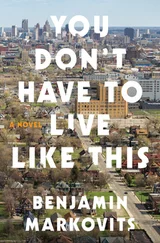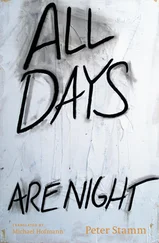“They make a little incision above the sternum, and insert a probe. You won’t feel a thing.”
“What else could it be?” asked Andreas.
The doctor told him not to worry. Andreas asked what the chances were. The doctor said it was meaningless to talk about chances.
“It’s either-or. You have it or you don’t.”
He stood up, returned his pen to the top pocket of his white coat, and shook hands with Andreas. He said he was sorry not to have had any better news.
Andreas stood in the empty classroom. The corridor rang with the running steps and shouts of boys and girls going home. He remembered his own time at school, the last day of term before the summer holidays, the way the kids ran off in all directions once the final class was at an end. The haste with which everyone disappeared, as though they were going somewhere. His best friend hardly stopped to say good-bye as he ran off, and Andreas felt betrayed. He had dawdled, gone home slowly with the big cardboard folder containing all the drawings he had done in the year. The folder was much too big for him; he needed both arms to carry it, to prevent the drawings from slipping out. Back then, summer had been something horribly, outlandishly long, and the beginning of the new school year was unimaginably far off.
He got his things together. On his desk was a little potted plant, a yellow primrose that one of his girls had given him as a good-bye present. The pot was wrapped in tinfoil. Andreas hesitated for a moment, thought about taking the plant home with him. Then he left it. He imagined it slowly withering and dying in neglect. In the fall, other children would be sitting here, shyly eyeing the new teacher.
He stowed books and papers away in desk drawers and in his case. Then he took down the posters on the walls, the collages and placards that the kids had made over the course of the year. Germany’s Constitutional System, German Cuisine, The Life of J. S. Bach. He rolled them all together, and rammed them into the wastebasket.
He walked through the empty school. He looked down at the yard through one of the tall windows. One of his pupils was sitting on a bench and kept looking anxiously toward the door. It was the boy who had been involved in the fights. Andreas wondered what he was waiting for, why he didn’t go home. The boy didn’t budge from where he was.
In the staff room there were still the white plastic cups for the end-of-term drinks that had been given out during the lunch break. Andreas tidied them away, along with the dirty napkins and the half-eaten rolls. He poured himself the remains of the white wine and took a sip. The wine was lukewarm and tasted sour. There was a knock, and Delphine stuck her head around the door.
“No one’s here?” she asked.
“Aren’t I anyone?”
“I wanted to say good-bye,” said Delphine. “It’s my last day today.”
“Come on in,” said Andreas. He found her a cup and poured her some of the wine. Delphine took a sip and shuddered.
“Disgusting,” she said. But she went on drinking it just the same. When she started helping Andreas clear the table, he stopped and said the janitor would take care of it.
“Aren’t you going home?” she asked.
“In a minute,” said Andreas. He said he felt a little envious of her.
“Why?”
“Because you’ve finished here. Because you’re about to walk out, and you’ll never come here again.”
“I’m sure I will. I’m going to visit my class. I promised them.”
“Don’t kid yourself.”
Delphine did not speak. Presumably she knew that Andreas was right. She would go to work at a different school, teach different classes, go out with different colleagues, and wrangle with different parents.
“There’s no point,” said Andreas. “You can’t go back.”
Each time a class graduated, a couple of the pupils promised they would come back and sit in on his new class. Once, someone really had, one of his favorite pupils. He had sat right at the back on an empty chair, and had listened in for half an hour. Then he had disappeared during the break, without saying good-bye.
“I think he was just as embarrassed as I was. I felt like a con artist. The same stories, the same jokes. Only a different audience.”
From his perspective her situation might indeed be enviable, said Delphine. But she would have to get used to a new place, and that wasn’t easy. She had settled here, and wouldn’t have minded staying.
“Do you know where you’re going to go?”
“To Versailles,” said Delphine. “Assuming I pass the exam. I would have preferred to go back to the South, where I come from. But for that I would have needed two hundred and seventy points. The only way I could get that many was if I were married and had a couple of kids.”
Andreas asked where she lived. She said she lived in a chambre de bonne nearby . Before that, she’d lived in Arles, with her parents.
“My father’s a policeman. I grew up in police barracks. We moved every other year.”
She wanted to go back South or to the Atlantic coast. Somewhere near the sea. She loved the sea. With a name like yours, that’s a surprise, said Andreas dryly. From Arles it wasn’t such a long way to the sea, said Delphine. And in the summer vacation, she had always gone to the Atlantic coast with her parents. There was a police campsite near Bordeaux. It was paradise.
By the time they left the school, the boy whom Andreas had watched out of the window was no longer there.
“I’ve got to go this way,” said Delphine, and she pointed down the street. Andreas said he’d walk her some of the way, if she didn’t mind. He didn’t feel like going home.
They walked along slowly side by side. Delphine talked about her class, and her qualifying exams, which she’d found difficult. Andreas asked her whether she was going to the Atlantic this summer.
“End of July,” she said, “after I’ve found myself somewhere to live in Versailles.”
They stopped in a bistro for a drink. First they stood at the bar, then they sat down in one of the little booths. Their legs touched, perhaps by chance. Andreas looked at Delphine. She was pale and her complexion was poor, but she had pretty features. Her dark hair was cut short and kept simple. She wasn’t very slim, but she looked fit.
They stopped talking. Delphine looked Andreas in the eye, smiled, and lowered her gaze. She said she lived just around the corner. Her room was tiny. Andreas said the room he’d lived in for the whole of his first year in Paris hadn’t been much bigger than the bed in it.
“It was in one of those cheap hotels by the station. They have wonderful names and terrible rooms. Mine was called Hotel de la Nouvelle France . I happened to walk past it the other day. The hotel doesn’t exist anymore. The building was gutted. The sign bearing the name is still there, but only the facade is left.”
He hadn’t passed that way by chance. It was in a fit of nostalgia that he had gone to the neighborhood, without really knowing what he was looking for. The streets hadn’t changed much to look at, but apart from the bakery and the Metro, there was no shop and no restaurant that he could recall. Over the door of his local pub there was still the sign, Le Cordial , but in the window there was a dusty scrap of cardboard that said Fermé, which was more accurate. In that first year, when Andreas came back from his nocturnal wanderings, the curtains of the bar would be drawn, and just a thin strip of light would indicate there was still anyone inside. He knocked on the glass door, and the owner pulled the curtain aside, and after looking at him suspiciously, he would unlock the door and admit Andreas. Back then, almost every night had come to an end in the Cordial , with crazy conversations that got ever stickier until they finally completely dried. In the morning, when Andreas took the train to work, he still felt the alcohol from the night before, and he had to make an effort not to fall asleep and miss his stop. The little room was filthy beyond description. The shelf that had once had bottles on it was empty. Tables and chairs were piled into one corner. Behind that was a photo screen that Andreas suddenly remembered one day. It was a yellowed mountain landscape, a small lake surrounded by trees, against a backdrop of snow-topped mountains. The picture must date from some previous owner. The host and most of the clientele were Algerians. Andreas wondered where Paco had got to, and his lovely wife, who had bossed her husband about like a kid.
Читать дальше












